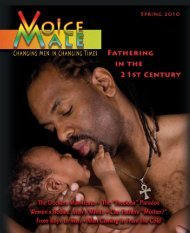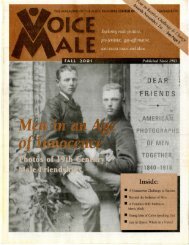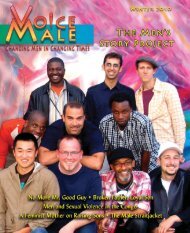to download - Voice Male Magazine
to download - Voice Male Magazine
to download - Voice Male Magazine
Create successful ePaper yourself
Turn your PDF publications into a flip-book with our unique Google optimized e-Paper software.
Reflections on Men’s Loss, Grief, Anger, and Change<br />
Finding the Way Through<br />
By Steve Cutting<br />
Anger is all the rage <strong>to</strong>day. We<br />
have “road rage,” “air rage,”<br />
“supermarket rage,” even<br />
“public bathroom rage.” It<br />
sounds kind of funny, but<br />
for many people, including myself, problems<br />
with controlling rage and impulsive<br />
anger are nothing <strong>to</strong> laugh about.<br />
Unhealthy anger may be a problem for<br />
both sexes, but I’m going <strong>to</strong> focus on men’s<br />
anger, and suggest that by taking a look at<br />
what may lie behind our destructive anger,<br />
men have the potential <strong>to</strong> s<strong>to</strong>p or at least<br />
reduce undesirable behavior that causes<br />
problems in their lives. By summoning the<br />
courage <strong>to</strong> look at the shadowy aspects<br />
of ourselves, we can experience personal<br />
transformation; we can rebalance our lives<br />
and become clearer, calmer, more accepting<br />
individuals. We can become builders<br />
instead of destroyers.<br />
A recent flyer for a course in anger management<br />
offered by the Men’s Resource<br />
Center for Change in Amherst, Mass.,<br />
open <strong>to</strong> both men and women, contains<br />
this advisory: “Destructive anger can<br />
wreak havoc in a man’s life—resulting<br />
in ruined relationships, job loss, physical<br />
endangerment, health problems and<br />
trouble with the law.”<br />
How true that is. About four years ago<br />
I moved <strong>to</strong> western Massachusetts <strong>to</strong> be<br />
closer <strong>to</strong> relatives when after the birth of<br />
our child, my wife was diagnosed with<br />
a degenerative neuromuscular condition,<br />
severely limiting her physical movement.<br />
Aside from being a great personal burden<br />
<strong>to</strong> her, my wife’s illness became an issue for<br />
us when the Department of Social Services<br />
intervened out of concern that her condition<br />
might limit her ability <strong>to</strong> be an effective<br />
parent. DSS also raised concerns that I had<br />
not been emotionally supportive <strong>to</strong> my wife,<br />
that I had frequently lost my temper, and<br />
that I had behaved inappropriately, even<br />
abusively, at times during our marriage.<br />
“The first of the<br />
Four Noble Truths of<br />
Buddhism—Life is suffering—<br />
<strong>to</strong>ok on an ironic sort<br />
of attraction <strong>to</strong> me because<br />
it directly contradicted<br />
everything I had been<br />
conditioned <strong>to</strong> believe.”<br />
After a long and contentious struggle,<br />
a family court interceded and concluded<br />
that our child would be better<br />
served by an In-Family Open Adoption.<br />
Fortunately, my younger brother and his<br />
wife were only <strong>to</strong>o willing <strong>to</strong> adopt our<br />
child. Presently our child is doing well<br />
in my brother’s family, with two older,<br />
previously adopted siblings who seem <strong>to</strong><br />
adore him. Because the adoption is in my<br />
family, I am fortunate <strong>to</strong> have contact and<br />
frequent visits with our child.<br />
Not so fortunate was our marriage.<br />
After the adoption, my wife and I were<br />
unable <strong>to</strong> work out our differences and<br />
have since separated and divorced.<br />
I have <strong>to</strong> say that I am truly sorry for<br />
the hurt I caused my ex-wife. She and I<br />
are at peace with our decision <strong>to</strong> separate<br />
and have accepted the decision <strong>to</strong><br />
place our child for adoption as the most<br />
appropriate choice under difficult circumstances.<br />
On the other hand, the pain<br />
of losing cus<strong>to</strong>dy of my child has given<br />
me the opportunity <strong>to</strong> reexamine choices<br />
I made in the past, both in my marriage<br />
and in other areas of life.<br />
I made choices with respect <strong>to</strong> managing<br />
stress, frustration, and not getting<br />
what I want in certain circumstances that<br />
were inappropriate. At times I chose <strong>to</strong><br />
respond <strong>to</strong> these stresses with impulsive<br />
rage and anger—which has had painful<br />
consequences and led <strong>to</strong> a period of loss<br />
and sadness in my life. Ironically, however,<br />
the experience of feeling sadness<br />
and grief over the consequences of my<br />
own behavior has been a necessary step<br />
<strong>to</strong>ward understanding and changing it.<br />
After losing the right <strong>to</strong> be my child’s<br />
parent, I was already suffering from selfdoubt<br />
and a fairly serious depression.<br />
After my wife moved out, even though<br />
I intuitively unders<strong>to</strong>od it <strong>to</strong> be the right<br />
thing, my depression deepened. As it<br />
turned out her leaving, as painful as it<br />
was, became the beginning of a kind<br />
of catalyst for change where I gradually<br />
began <strong>to</strong> perceive things differently.<br />
Although it wasn’t by choice, for the<br />
first time in a number of years I began<br />
<strong>to</strong> spend a great deal more time alone,<br />
providing an opportunity <strong>to</strong> reflect on the<br />
repercussions of choices I had made. This<br />
time became a kind of vehicle for change<br />
and helped shift my focus inward <strong>to</strong>ward<br />
the source of my own personal turmoil<br />
and angst, rather than outward <strong>to</strong>ward<br />
blaming external circumstances.<br />
As a way of dealing with anger I began<br />
<strong>to</strong> pay more attention <strong>to</strong> Buddhism,<br />
which I had been aware of, but never<br />
seriously looked at. The first of the Four<br />
Noble Truths of Buddhism—Life is suffering—<strong>to</strong>ok<br />
on an ironic sort of attraction<br />
<strong>to</strong> me because it directly contradicted<br />
everything I had been conditioned <strong>to</strong><br />
believe. The Buddhist principle of the<br />
impermanence of all things helped me<br />
understand my experience and provided<br />
some relief from the deep changes and<br />
personal losses I had endured.<br />
continued on page 23<br />
F a l l 2 0 0 6 •<br />
15










